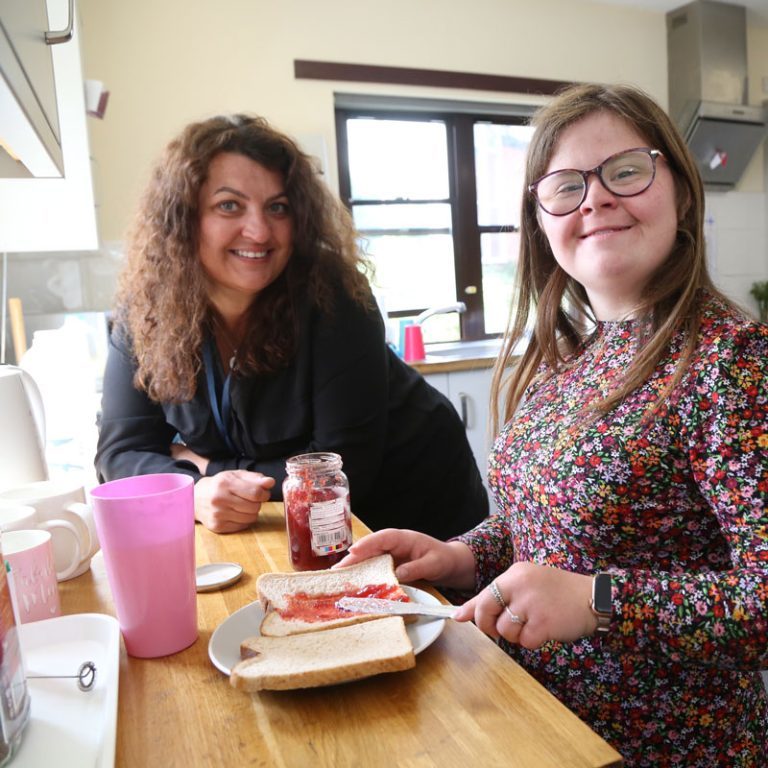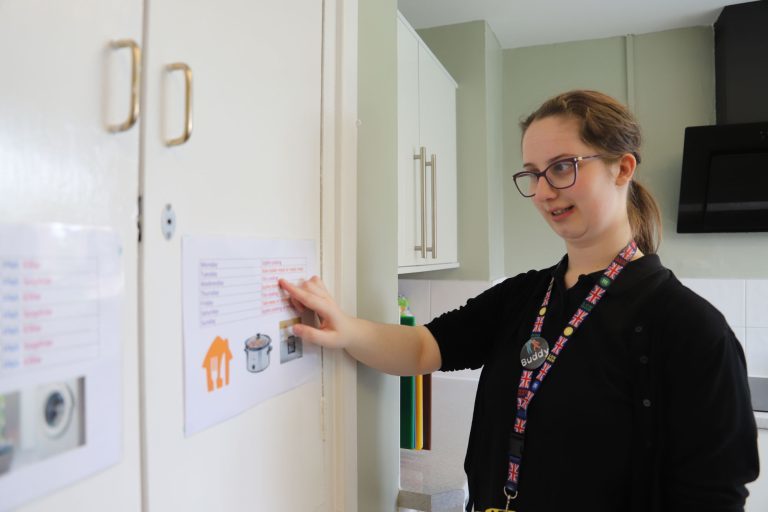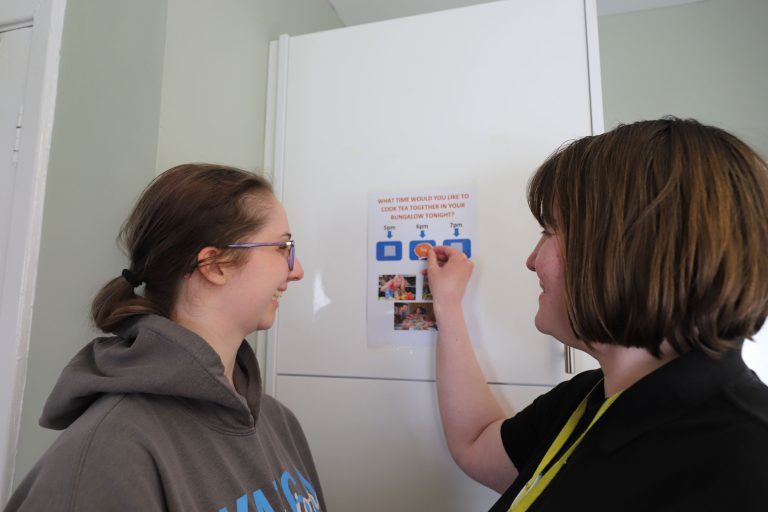Living more independently at Derwen College
Summer term is the busiest time of the year for Emma Millington, Lead Care Practitioner, and her team of support practitioners on the bungalow site at Derwen College.
The ten on-site bungalows at Derwen are viewed by students as an important part of their journey towards a more independent life.

Whilst the bungalows won’t suit the needs of all students, for those who are ready for the next steps in their independence journey it is an important facility to have access to.
During the summer term, the bungalow team work intensively with two groups of students: those moving to the bungalow site, and those moving out – and ultimately finishing their time at Derwen.
Staff from residences and other departments across the College meet on a regular basis from the spring term. It is during these meetings that a multi-disciplinary team have the opportunity to suggest which students they think would be suitable to move from their current residence at Derwen, and into the bungalows. Usually this would be after the student’s first year, but a few students have been known to move to the bungalows after the first term.
Person-centred approach
Derwen’s person-centred approach means that students are central to any decisions to be made about them while at College.
Emma says “residence teams from across College suggest who they think is ready to move to the bungalows, but the decision of living in the bungalows is ultimately the student’s own”. “We always approach the student first to see what they think of the idea – inevitably we then have phone calls from anxious parents who have received an excited phone call from their young person!”
Some parents can be worried that their young person will be living completely independently in the bungalows. Whilst students see the bungalow site as a pinnacle of independence at Derwen, the reality is that the young people living there still have daily support from staff to help them work towards independence – though the support will be different to their previous residence.
There is a period of assessment during the summer term to ensure that the bungalows are the right place for each student. Even after a positive move into the bungalows, there can be a period of adjustment. Some students will struggle to settle into the familiar, yet new, environment; whilst most will be completely at ease from the first day.
Support within the bungalows
 During the day, a support practitioner from the dedicated care team works with students in their own bungalow. Support practitioners work proactively to help students to build a work and living routine: preparing for, and going to work on time, coming home and making food for themselves. They also provide support for students whilst they work on their community skills – travel training, budgeting, shopping.
During the day, a support practitioner from the dedicated care team works with students in their own bungalow. Support practitioners work proactively to help students to build a work and living routine: preparing for, and going to work on time, coming home and making food for themselves. They also provide support for students whilst they work on their community skills – travel training, budgeting, shopping.
The bungalow team work with individual students to create resources to initiate prompts which enable them to do everyday tasks more independently. This could involve visual prompts for settings on the oven, microwave or washing machine. Or it could be that students need timetable reminders set up on their phone, which will give them prompts throughout the day. The telephone in each bungalow has a prompt poster nearby to ensure that students use the phones effectively and appropriately.
Living together
Students will live with others who have a similar level of support needs, and are matched to ensure they would get on well. Which bungalow they live in is decided with the consent of all involved, and all students know who they will live with before they leave College for the summer holidays. Some students will live in a mixed-gender bungalow. Other students will need to have constant staff support (maybe for medical conditions), and they will live in, or very close to a staffed bungalow – where a member of staff is available 24 hours a day.
Security is an important part of living at the bungalows. Being able to use the phone is a key skill for students to have (and is part of their assessment for suitability to live at the bungalows), so that they can contact staff at any time. Additionally, CCTV around the bungalows is motion activated, and staff can be alerted to a student’s need. So whilst the students are independent as possible, support is never more than a couple of minutes away.
The team are also on hand to support students when they are ill. “Parents sometimes worry that during periods of illness a student would be alone in their bungalow. But this is one of the most important times students will need that care and reassurance, and the team increase their support accordingly”.
Social time
Whilst living at the bungalows, staff aim to make the experience a home away from home for students. Friends are able, and encouraged, to visit each other from other bungalows and College residences. Regular trips out are organised to places such as bowling, the cinema, celebrating birthdays and to the beach, and students can suggest places they would like to visit.
Students are able to come and go from their bungalow any time during the day, but need to remain within the College grounds. Staff have rigorous safeguarding procedures and routine checks throughout the day to ensure all students have been seen regularly by staff. If students would like to go further afield – for example to the local shop – staff will accompany them unless they have been through their rigorous travel training and assessment, and are confident to go independently.
As with all young people, students’ friendships and romantic relationships can develop, go through rocky patches – and also break down. The team work with students (and families) to develop lines of communication and trust so that when they need to talk about anything to do with their friendships, students know that the team are on-hand to offer guidance and education around building and maintaining healthy relationships, or to simply provide a listening ear!
Transition to a new home
It is a little truly realised fact that from the moment a student joins Derwen, staff are planning for their transition to life after College. For those students moving out of their bungalow and away from Derwen, the summer term is spent making final preparations to help them transition to their next home.
Staff spend time assessing whether each student will be most suited to supported living or a residential pathway after leaving College. Students will be supported by parents or carers, as well as social workers to visit their provision where they will live when they leave College. The bungalow team facilitates video calls for students to meet those they will live with next and to meet their new staff – to help ensure that they have a smooth transition.
The key to a successful transition is communication with all involved. Not only are staff in the bungalows supporting students, but they will also be communicating with anxious parents or carers. Additionally, staff will be talking to social workers as well as staff from each student’s next placement.
Emma says that although the summer term is busy period of excitement and anxiety for next steps and new beginnings, it is also a rewarding time. “Students living in the bungalows have had the opportunity to increase their independence skills, learnt to live with others and make their own decisions in the least restrictive way. They’ve been able to build their confidence as they navigate adult life in a safe and supported environment. We are confident that with continued support from their next provision, students will continue to build their independence skills and lives their lives as they chose to”.

